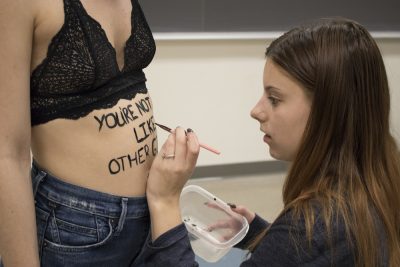
Boston University’s He for She chapter launched its Written on the Body photo campaign last week to highlight sexism and violence against women.
The Written on the Body campaign is the group’s first social media initiative since its founding two years ago, when then-freshmen Francesca Ogilvie and Grace Li started the club. The campaign aims to raise awareness of slut-shaming and provide a way for women to reclaim derogatory terms and slurs.
Meredith Varner, a freshman in the College of Communication and the chapter’s marketing and social media director, said the campaign was created as a way to allow people to take control of their bodies.
Participants used black paint to write words and phrases on their bodies that have been said to them, Varner said. On one girl’s body was written, “You have the potential to be hot.” Another’s read, “You’re not like other girls.”
This is not He for She at BU’s first initiative. The group has hosted speakers, including Nadya Okamoto, founder and executive director of PERIOD., an initiative to provide menstrual products to homeless women. Varner said the chapter has also sponsored an art exhibit and a campaign against violence.
He for She currently has few male members — something that chapter secretary Sarah Mar said the group is trying to change.
“The guys that have been in it have been really active,” the COM senior said. “But it isn’t a ton.”
He for She is seeking to increase its membership and stresses that the group is open to everyone. Varner said the Written on the Body campaign has already begun to accomplish that.
“We’re still working on it,” Varner said. “There’s a lot of people we’re able to reach, but not a lot of people who come to meetings on Mondays … Our outreach is definitely expanding. We just gained 25 followers from this campaign in a few days.”
Chapter vice president Manjot Chhabra, a junior in CAS, said the group plans to include male volunteers in its current campaign. The goal is to encourage these volunteers to emphasize messages about anti-femininity that men and boys receive, specifically the phrase “man up.”
“I feel like the name ‘He for She’ was criticized a lot when it first came out because it is very binary,” Chhabra said, “so we’re trying to make sure that people don’t get the wrong idea, and know we welcome as many genders as possible.”
Participants were recruited over Instagram and Facebook to have their pictures taken and share their personal experiences.
Sidney McKenzie, a sophomore in the College of General Studies, wrote in an email that she participated in the project because she thinks using human bodies as canvases is a powerful tool.
“I spoke about intersectional feminism and the concept of ‘boys will be boys,’” McKenzie wrote. “On the one hand, I am a believer that feminism isn’t feminism unless it’s intersectional. Also, the idea of ‘boys will be boys’ irritates me because it doesn’t [hold them] accountable for their actions.”
Amy Katsamakis, a senior in CAS, wrote in an email that she participated in the campaign to share her voice.
“I’ve carried the statement written on me around with me for years,” Katsamakis wrote.
Maya Ernest, a sophomore participant in CGS, wrote in an email that she thinks the project proves everyone has a story to share and that people are not alone in their experiences.
“I think as the discussion of sexual harassment and body image grows to be more open in the media, we should be more open with our bodies and stories,” Ernest wrote. “I’m hoping the project will add to these discussions, especially around campus.”
DISCLAIMER: Meredith Varner, He for She at BU’s marketing and social media director, is also a columnist for The Daily Free Press.


















































































































Ryan Gallo • Mar 26, 2018 at 7:47 pm
This is great! Is there an IG for this organization? I would love to follow and promote this.
Manjot • Apr 12, 2018 at 12:25 am
@heforshebu !!